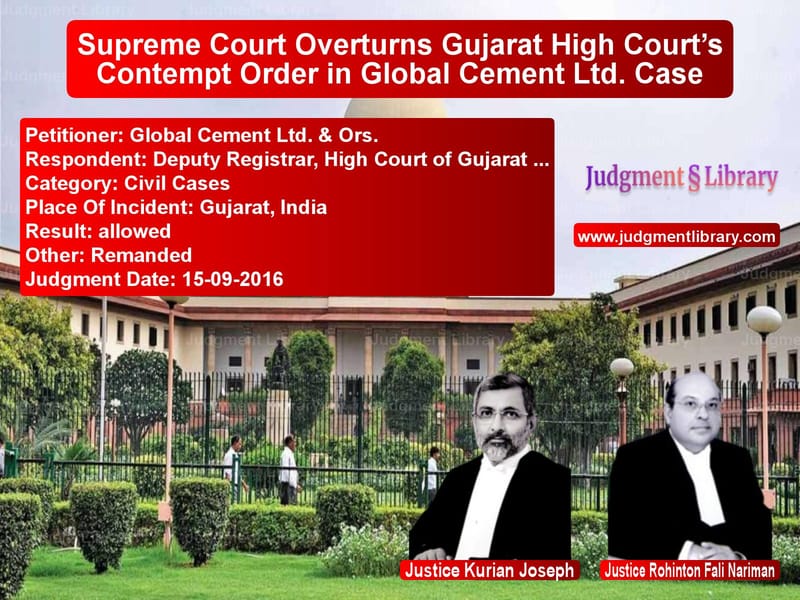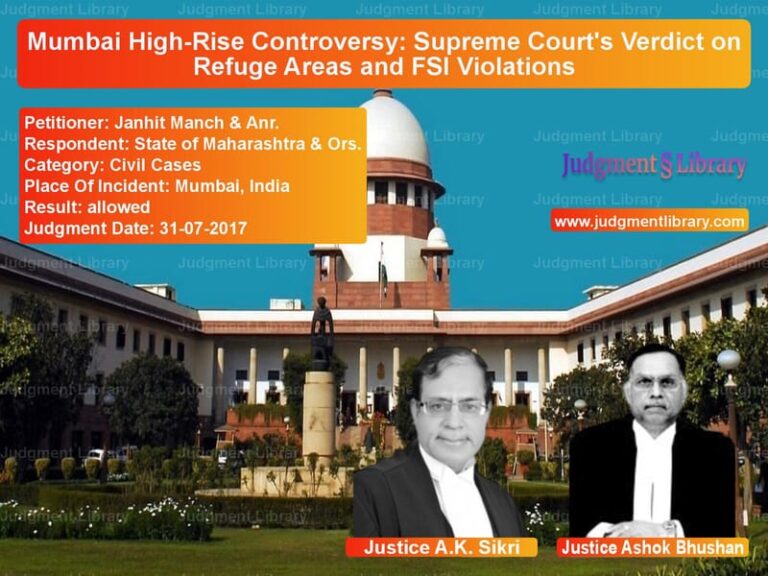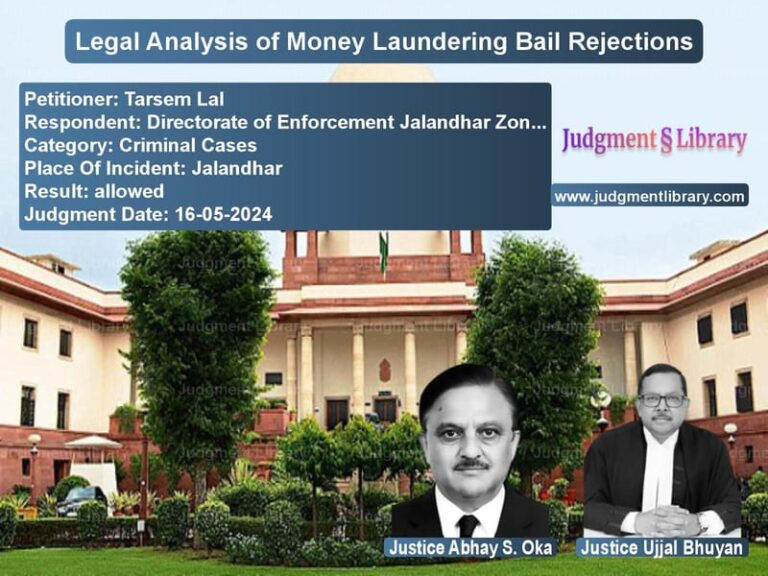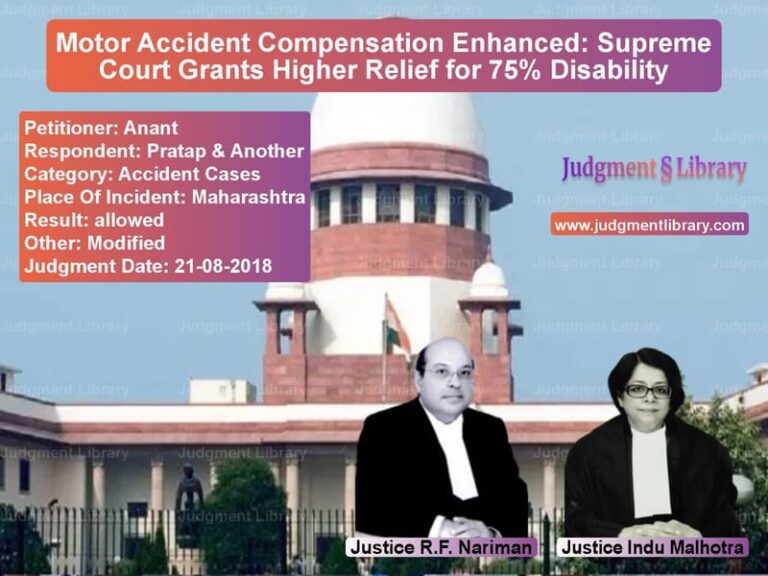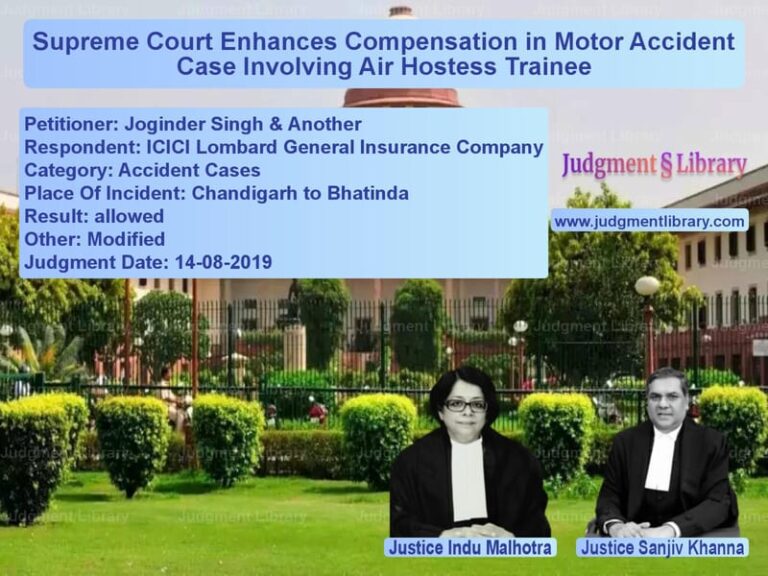Supreme Court Overturns Gujarat High Court’s Contempt Order in Global Cement Ltd. Case
The case of Global Cement Ltd. & Ors. v. Deputy Registrar, High Court of Gujarat at Ahmedabad & Ors. revolves around the Gujarat High Court’s contempt order against Global Cement Ltd. The Supreme Court set aside the order, which required the company to deposit an amount that had never been directed by the learned Single Judge. The ruling underscores the importance of precise judicial directives and ensures that financial obligations cannot be imposed without a legal basis.
Background of the Case
Global Cement Ltd. was facing contempt proceedings initiated by the Gujarat High Court. The dispute stemmed from an order dated 22.01.2015, which directed the company to deposit an amount allegedly based on an order from the learned Single Judge. However, it was later discovered that no such deposit requirement had been imposed by the Single Judge.
The High Court’s order stated:
“The respondents are directed to deposit the amount in terms of the order of the learned Single Judge and if the amount is not deposited, the respondents are directed to remain present on the next date of hearing.”
Challenging this directive, the appellants approached the Supreme Court, arguing that the deposit requirement lacked any legal foundation.
Key Legal Issues
- Did the Gujarat High Court err in directing Global Cement Ltd. to deposit an amount that was never ordered by the Single Judge?
- Could contempt proceedings be sustained based on a judicial misinterpretation?
- Did the Supreme Court need to intervene to rectify the procedural mistake?
Arguments from the Petitioner (Global Cement Ltd. & Others)
- The petitioners argued that the High Court had misinterpreted the Single Judge’s order and imposed a financial burden without any legal justification.
- They contended that the contempt proceedings had been initiated on an erroneous premise and should be dismissed.
- The petitioners emphasized that no violation of any actual judicial directive had occurred.
Arguments from the Respondents (Deputy Registrar, High Court of Gujarat)
- The respondents acknowledged that no deposit order had been issued by the Single Judge.
- However, they contended that the contempt proceedings were justified on other legal grounds.
- The respondents suggested that the case should be left for further examination by the Gujarat High Court’s Division Bench.
Supreme Court’s Judgment
1. Absence of Legal Basis for the Deposit Order
The Supreme Court found that the High Court’s directive requiring a deposit was erroneous, as it was not supported by any judicial order. The judgment stated:
“Mr. H. P. Rawal, learned senior counsel appearing for Respondent No. 2, fairly submits that there was no direction by the learned Single Judge for deposit of any amount.”
Given this admission, the Court held that the High Court’s order lacked legal validity.
2. Remitting the Case to the High Court
Rather than ruling on the substantive merits of the contempt proceedings, the Supreme Court chose to allow both parties to present their arguments before the Division Bench of the Gujarat High Court. The judgment stated:
“Both parties are free to raise all available contentions before the Division Bench of the High Court.”
3. Setting Aside the Contempt Order
The Supreme Court concluded that since there was no basis for the deposit order, it had to be set aside. However, the Court clarified that the case was being remitted for further consideration:
“Accordingly, we set aside the impugned order dated 22.01.2015 and remit the matter to the High Court.”
Implications of the Judgment
This ruling reinforces several legal principles:
- Court orders must be based on actual judicial findings, and misinterpretations cannot create new financial obligations.
- Contempt proceedings must be based on clear legal violations, not incorrect judicial assumptions.
- The Supreme Court acts as a corrective mechanism to prevent procedural errors.
- Litigants must challenge flawed judicial orders at the earliest opportunity to prevent unnecessary compliance burdens.
Key Takeaways
- Orders requiring financial deposits must be supported by clear judicial directives.
- Contempt proceedings should only proceed when a party has willfully disobeyed a legitimate order.
- Errors in judicial interpretation can be corrected at the appellate level.
- The Supreme Court often remits matters for further review rather than dismissing them outright.
Conclusion
The Supreme Court’s decision in Global Cement Ltd. & Ors. v. Deputy Registrar, High Court of Gujarat at Ahmedabad & Ors. highlights the importance of judicial precision in issuing directives. By setting aside the erroneous order and remitting the case for further review, the Court ensured that legal principles were upheld while allowing the High Court to reassess the contempt proceedings based on factual accuracy.
Don’t miss out on the full details! Download the complete judgment in PDF format below and gain valuable insights instantly!
Download Judgment: Global Cement Ltd. & vs Deputy Registrar, Hi Supreme Court of India Judgment Dated 15-09-2016-1741883755577.pdf
Direct Downlaod Judgment: Direct downlaod this Judgment
See all petitions in Contract Disputes
See all petitions in Debt Recovery
See all petitions in Judicial Review
See all petitions in Judgment by Kurian Joseph
See all petitions in Judgment by Rohinton Fali Nariman
See all petitions in allowed
See all petitions in Remanded
See all petitions in supreme court of India judgments September 2016
See all petitions in 2016 judgments
See all posts in Civil Cases Category
See all allowed petitions in Civil Cases Category
See all Dismissed petitions in Civil Cases Category
See all partially allowed petitions in Civil Cases Category

